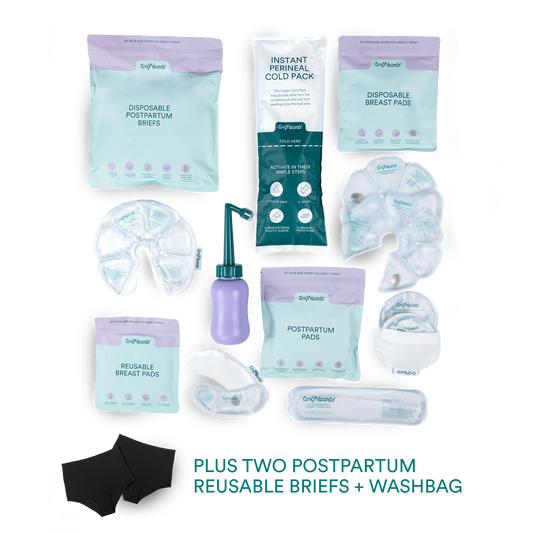When you first fall pregnant, feeling a little queasy in the morning can be a welcome sign that everything is progressing well. If it’s your first pregnancy it can even feel like an initiation into a special club - ‘yay, I’m really pregnant!’ you might say. But if the sickness hangs around longer than you expect, or it leaves you unable to live a normal life there’s not much to celebrate. So, how do you cope with severe nausea and vomiting during pregnancy?
I know first hand that this is not an easy question to answer. I’ve had two pregnancies afflicted with the severe form of pregnancy sickness known as Hyperemesis Gravidarum. Both times I suffered incapacitating nausea from 5-weeks, uncontrollable vomiting became the norm from 6-weeks and both of these delightful symptoms stuck around until I delivered. In my first pregnancy I lost 15 kilos and in my second I lost 10 - in both, I was lighter on the day I delivered my babies than I had been at the start of my pregnancy. I couldn’t eat properly, the sight and smell of water instantly made me dry heave, and I lived on an incredibly healthy diet of hot chip sandwiches and McDonald’s frozen cokes.
When my first baby was six weeks old I decided that I had to take this traumatic experience and turn it into something positive. I’d noticed that a lot of healthcare professionals just don’t have a great deal of experience when it comes to treating pregnancy sickness and a lot of sufferers feel isolated and traumatised by what’s happening to them. So, I started Hyperemesis Australia. We’re a charitable organisation that works to support sufferers of pregnancy sickness, their families and aims to educate healthcare professionals on what is best practice in terms of treatment and support.
So, what exactly is pregnancy sickness and Hyperemesis Gravidarum, and how do you know if what you have is morning sickness or more serious?
Nausea and Vomiting in Pregnancy or NVP is a condition that does what it says on the tin; causes severe nausea and vomiting in pregnant women. It's more than morning sickness. Hyperemesis Gravidarum or HG is the most severe type of pregnancy-related nausea and vomiting. It's a serious and debilitating condition that is incredibly dangerous for mum and baby. It's WAY more than morning sickness.
Imagine pregnancy sickness is a spectrum; at one end is morning sickness, it’s a bit annoying but doesn’t impact your ability to live normally and clears up after the first trimester; in the middle is NVP which does interfere with your ability to eat, drink, work and look after your family; at the end is HG which is so severe you can’t function normally at all, you’re bed-ridden, dehydrated, losing weight and often need to be hospitalised.


If you think you, or someone you love might be struggling with NVP or HG we do have some tips for coping:
We have a few tried and tested tips for coping with day-to-day sickness:
- Read as much about HG as you can find - visit our website for good, knowledgeable sources of information. Become an expert in what’s happening to your body and then educate your partner, children, parents, friends, co-workers and other caregivers. Yes, even your doctors may need you to provide them with further reading
- Keeping a diary can help you keep track of when are the best times for you to eat, how much you have managed to eat, and what fluids you have been able to retain. In the event you need to present to ED, or check in with your GP, this will be an easy way to enlighten them about your condition
- Rest is important to any pregnant person, regardless of how well they are feeling. Many sufferers of severe NVP, and HG, find that regular rests are key to helping manage their symptoms. This kind of nausea is similar to motion sickness, where keeping still can offer a slight reprieve from the sickness
- All pregnant people are encouraged to take a multivitamin that contains 400 micrograms of folic acid daily. However, some brands may exacerbate your HG symptoms - you may even find it difficult to swallow the tablet. This is something important to raise with your obstetrician, midwife or GP so that alternatives can be investigated
- A common pregnancy symptom is a heightened sense of smell and this can be a particularly intense trigger for those with HG. The smell of cooking, especially fatty foods, coffee, tea, cigarette smoke, or perfume are the most common offenders. Try to avoid anything that heightens your nausea, or induces vomiting. Keep a list of your trigger smells handy and share it with anyone you spend time with
But how can you tell when it all goes a bit far - how do you know when it’s time to bring in the big guns and get some help for your symptoms? Let us break it down real simple for you:
- Are your symptoms impacting your ability to live your life as normal?
- Are you unable to drink (or keep down) at least 500ml of water in 24 hours?
- Do you spend more time nauseous or vomiting than you do feeling tip top?
If you answered yes to any or all of these questions then it’s time to go and talk to your doctor. You probably need a plan of action when it comes to managing your symptoms and controlling them to the point where you can begin to eat and drink a bit more normally. You can do this in one of two ways:
- Head to your GP or obstetrician
If you don’t feel like you need immediate attention (we’ll touch on how to decide this in the next section) then making an appointment with your GP or obstetrician ASAP is the way to go. You’ll want to make sure you have a few pieces of information when you go so that your doctor has all the information to treat you properly:
- How much you have been able to eat or drink (and keep down) each day
- How often you vomit, the times you feel nauseous and how frequently your urinating
- A list of the symptoms you’re having ie. nausea, vomiting, excess saliva, heartburn/acid reflux, food aversions, headaches, constipation
Your doctor is likely to recommend trying a regime of natural remedies in order to alleviate your symptoms. If you feel like this is a good option for you, that’s great. However, current research shows that ginger and vitamin b6 (the common alternative therapies recommended for pregnancy sickness) have no therapeutic effect. However, other sources continue to support it as an effective treatment option. Ultimately, the choice is yours and either way, you should feel confident in your decision to try this first, or progress straight to prescription medication.
The recommended treatment according to the Society of Obstetric Medicine of Australia and New Zealand Guideline for the Management of Nausea and Vomiting in Pregnancy and Hyperemesis Gravidarum is as follows:
MILD NVP OR HG
Pyridoxine (Vitamin B6)
MODERATE NVP OR HG
One of the following taken orally up to three times daily:
- Doxylamine
- Prochlorperazine
- Promethazine
- Metoclopramide
To avoid sedation and for prolonged use i.e. more than 5 days, use ondansetron during the day.
Additional treatment:
- H2 antagonist eg. Ranitidine orally twice daily
- IV fluids 1-3 x per week as required
SEVERE HG
Ondansetron taken orally two to three times daily
Night time dosing with one of the following:
- Metoclopramide
- Prochlorperazine
- Doxylamine
- Cyclizine
Consider adding:
Prednisone or hydrocortisone.
Additional Treatment:
- Cease H2 antagonist and substitute with a proton pump inhibitor twice daily eg. Esomeprazole or Rabeprazole
- IV fluids 1-3 x per week as required. Add IV thiamine if poor oral intake or administering dextrose
It is widely agreed that the best and most effective way to manage symptoms of HG and NVP is to layer multiple medications together each day. There are a number of factors that cause the symptoms of each of these conditions and each one needs to be targeted in order to achieve any kind of relief.
The earlier this regime of medications is started the sooner you’ll feel better. And, the sooner you’ll know whether you need to add more medications. In saying this, please don’t commence medication that isn’t prescribed for you, or hasn’t been approved by your Doctor or Midwife. That’s because everyone’s health care and pregnancy circumstances are slightly different, so it’s always best to seek medical advice before commencing medication in pregnancy. They’ll also be able to discuss with you dosages, and how many times per day to take the medication.
2. Go to your hospital’s Emergency Department
If you feel like you need more immediate help than waiting for an appointment with your GP or OB then it is best to go to the ED. This can be a really daunting decision to make - I totally get that. But you have every right to seek help from the ED team at your hospital and they are there to help you.
If you’re wondering about how you know whether it’s okay to go to ED here’s a helpful checklist:
- Have you been thinking you might need to go to the hospital?
That’s literally it. Healthy people who have no need to be in the hospital do not spend their time wondering if they need to go to the hospital. If it has occurred to you that going to ED might be a possibility then you’re definitely sick enough to be there. Make sure you have the same details together as we suggested for visiting your GP above.
When in hospital we recommend adding the following treatment to your daily regime for when you’re an inpatient based on the same guidelines from SOMANZ as mentioned above:
- Fluid replacement with normal saline 1-2L over 1-4 hours
- Antiemetics (try sequentially)
- IV potassium, magnesium, thiamine
Then, continuing with the same regime outlined above when you are discharged. If possible, arrange with your GP or OB to visit the hospital 2 or 3 times each week for the fluid top-ups with IV potassium, magnesium, thiamine plus IV antiemetics.
These recommendations are made by the Society of Obstetric Medicine of Australia and New Zealand and enacted by all the major hospitals in Australia. However, many doctors, nurses and midwives don’t have direct experience with treating HG and NVP so these protocols are not always automatically applied. It’s also important to flag that some medical conditions that may occur alongside HG, such as preeclampsia, can impact your management plan e.g. a fluid restriction. So while these guidelines are effective, they're just that- guidelines. Each mama requires individualised care depending on her pregnancy circumstances and blood test results. This means that you may not have specifically this treatment, and if that’s the case, you’re well within your rights to ask why/ why not.
If you have any issue with receiving treatment or an effective management plan that is helping you, please get in touch so we can advocate for you and work with your medical team to get you the best treatment that’s also suitable for your pregnancy needs.
The biggest piece of advice I have is to be kind to yourself. You don’t feel like yourself right now, you probably feel like you’re failing the people you love and carrying a lot of guilt for that. But this is just a short period of your life where you need to take care of yourself. Growing a baby is hard enough without the added sickness so cut yourself a break, grab a Frozen Coke and have a rest. You will get back to your old self soon, I promise.









